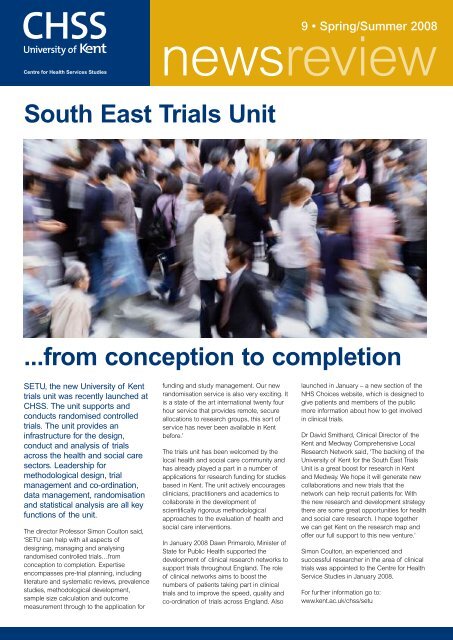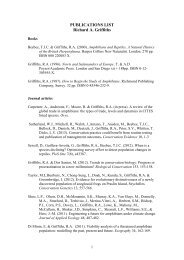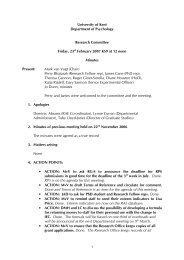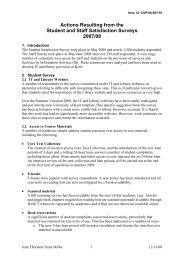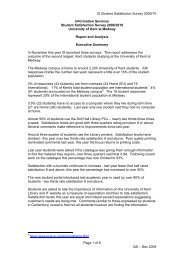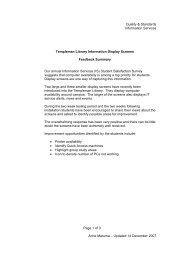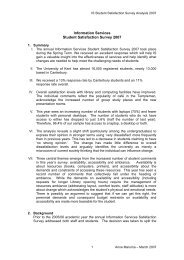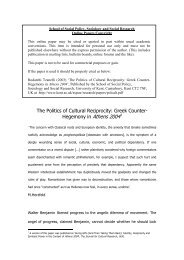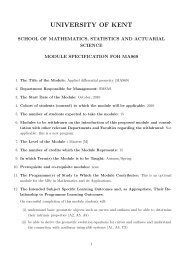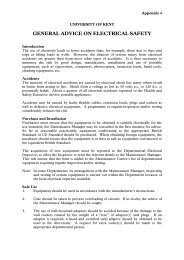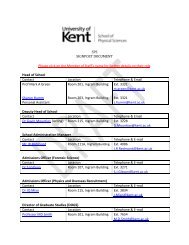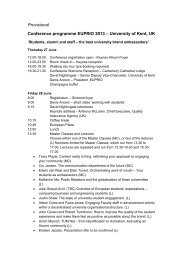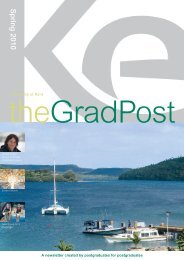chss newsletter8 - University of Kent
chss newsletter8 - University of Kent
chss newsletter8 - University of Kent
Create successful ePaper yourself
Turn your PDF publications into a flip-book with our unique Google optimized e-Paper software.
South East Trials Unit<br />
9 • Spring/Summer 2008<br />
newsreview<br />
...from conception to completion<br />
SETU, the new <strong>University</strong> <strong>of</strong> <strong>Kent</strong><br />
trials unit was recently launched at<br />
CHSS. The unit supports and<br />
conducts randomised controlled<br />
trials. The unit provides an<br />
infrastructure for the design,<br />
conduct and analysis <strong>of</strong> trials<br />
across the health and social care<br />
sectors. Leadership for<br />
methodological design, trial<br />
management and co-ordination,<br />
data management, randomisation<br />
and statistical analysis are all key<br />
functions <strong>of</strong> the unit.<br />
The director Pr<strong>of</strong>essor Simon Coulton said,<br />
‘SETU can help with all aspects <strong>of</strong><br />
designing, managing and analysing<br />
randomised controlled trials…from<br />
conception to completion. Expertise<br />
encompasses pre-trial planning, including<br />
literature and systematic reviews, prevalence<br />
studies, methodological development,<br />
sample size calculation and outcome<br />
measurement through to the application for<br />
funding and study management. Our new<br />
randomisation service is also very exciting. It<br />
is a state <strong>of</strong> the art international twenty four<br />
hour service that provides remote, secure<br />
allocations to research groups, this sort <strong>of</strong><br />
service has never been available in <strong>Kent</strong><br />
before.’<br />
The trials unit has been welcomed by the<br />
local health and social care community and<br />
has already played a part in a number <strong>of</strong><br />
applications for research funding for studies<br />
based in <strong>Kent</strong>. The unit actively encourages<br />
clinicians, practitioners and academics to<br />
collaborate in the development <strong>of</strong><br />
scientifically rigorous methodological<br />
approaches to the evaluation <strong>of</strong> health and<br />
social care interventions.<br />
In January 2008 Dawn Primarolo, Minister <strong>of</strong><br />
State for Public Health supported the<br />
development <strong>of</strong> clinical research networks to<br />
support trials throughout England. The role<br />
<strong>of</strong> clinical networks aims to boost the<br />
numbers <strong>of</strong> patients taking part in clinical<br />
trials and to improve the speed, quality and<br />
co-ordination <strong>of</strong> trials across England. Also<br />
launched in January – a new section <strong>of</strong> the<br />
NHS Choices website, which is designed to<br />
give patients and members <strong>of</strong> the public<br />
more information about how to get involved<br />
in clinical trials.<br />
Dr David Smithard, Clinical Director <strong>of</strong> the<br />
<strong>Kent</strong> and Medway Comprehensive Local<br />
Research Network said, ‘The backing <strong>of</strong> the<br />
<strong>University</strong> <strong>of</strong> <strong>Kent</strong> for the South East Trials<br />
Unit is a great boost for research in <strong>Kent</strong><br />
and Medway. We hope it will generate new<br />
collaborations and new trials that the<br />
network can help recruit patients for. With<br />
the new research and development strategy<br />
there are some great opportunities for health<br />
and social care research. I hope together<br />
we can get <strong>Kent</strong> on the research map and<br />
<strong>of</strong>fer our full support to this new venture.’<br />
Simon Coulton, an experienced and<br />
successful researcher in the area <strong>of</strong> clinical<br />
trials was appointed to the Centre for Health<br />
Service Studies in January 2008.<br />
For further information go to:<br />
www.kent.ac.uk/<strong>chss</strong>/setu
2<br />
Simon Coulton<br />
Pr<strong>of</strong>essor Simon Coulton brings a wealth <strong>of</strong><br />
experience in setting up and running<br />
randomised controlled trials as well as<br />
experience in epidemiological and<br />
quantitative research.<br />
Possessing a background in psychology<br />
and psychosocial interventions, particularly<br />
for trials <strong>of</strong> interventions for alcohol and<br />
substance misuse, Simon Coulton has been<br />
involved with many large-scale studies that<br />
have impacted on the way in which<br />
healthcare is delivered in the UK. His<br />
previous research has encompassed a<br />
variety <strong>of</strong> clinical areas including screening<br />
for deafness in young children, reducing<br />
surgical interventions for glue ear, the<br />
management <strong>of</strong> back pain and selfmanagement<br />
<strong>of</strong> patients with heart failure.<br />
His current research includes funding from<br />
the Medical Research Council, National<br />
Institute <strong>of</strong> Health Research, Department <strong>of</strong><br />
Health and European Union. This funding<br />
includes £987,000 from the NIHR HTA to<br />
examine the relative effectiveness and costeffectiveness<br />
<strong>of</strong> stepped care interventions<br />
versus treatment as usual for older alcohol<br />
users in primary care. He is also a principal<br />
investigator for the largest study <strong>of</strong><br />
interventions for alcohol use disorders ever<br />
conducted, Screening and Brief Intervention<br />
Pilots funded by the Department <strong>of</strong> Health.<br />
Andy Alaszewski, Pr<strong>of</strong>essor <strong>of</strong> Health<br />
Studies and Director <strong>of</strong> CHSS, said: ‘We are<br />
delighted to have Simon in CHSS. His skills<br />
complement the unit’s growing ability to<br />
conduct mixed methods research and trials.<br />
We are very pleased to have him at the<br />
<strong>University</strong> <strong>of</strong> <strong>Kent</strong> and look forward to his<br />
developing research partnerships here with<br />
health and social care organisations and<br />
agencies.’<br />
For further information contact Simon<br />
Coulton on 01227 824535 or email<br />
s.coulton@kent.ac.uk<br />
Health and Social<br />
Survey Unit<br />
Hospice patient survey<br />
The CHSS Health and Social Survey Unit are<br />
running the Hospice Patient Survey again for<br />
2008 and 2009. The survey is conducted on<br />
behalf <strong>of</strong> hospices nationally and<br />
co-ordinated through the charity Help the<br />
Hospices. It measures patient satisfaction<br />
with hospice services.<br />
Linda Jenkins, who has managed the survey<br />
on behalf <strong>of</strong> CHSS for the last two years<br />
said ‘We’re delighted to be asked to do the<br />
survey again because it provides great<br />
value for money. Hospices appreciate<br />
getting reliable results in a convenient format<br />
to engage managers at all levels from the<br />
board downwards, and it gives service<br />
users the opportunity to make their voices<br />
heard.’<br />
You can see the results <strong>of</strong> previous surveys<br />
at: www.helpthehospices.org.uk/index.asp<br />
For further information contact Charlotte<br />
Hastie on 01227 823690 or email,<br />
c.l.hastie@kent.ac.uk<br />
Caring in <strong>Kent</strong><br />
A picture <strong>of</strong> caring in <strong>Kent</strong> was published<br />
recently by the Health and Social Survey<br />
Unit in conjunction with the <strong>University</strong>’s<br />
Tizard Centre. The ‘Caring in <strong>Kent</strong>’ 2008<br />
report draws on the results <strong>of</strong> a <strong>Kent</strong> wide<br />
‘Health and Lifestyle Survey’ conducted in<br />
2005.<br />
The report gives a general pr<strong>of</strong>ile <strong>of</strong> carers,<br />
levels and types <strong>of</strong> care-giving, carers’<br />
health, and the level and types <strong>of</strong> support<br />
they receive.<br />
Carers provide unpaid care by looking after<br />
an ill, frail or disabled family member, friend<br />
or partner. The increasingly important role <strong>of</strong><br />
the ‘informal carer’ is – in good part – due to<br />
the rising proportion <strong>of</strong> older people in the<br />
UK population. Not only do people live<br />
longer but many experience a number <strong>of</strong><br />
chronic conditions; these require support<br />
from family members if the older person is<br />
to remain living in the community.<br />
The report was commissioned by <strong>Kent</strong><br />
County Council. The full report and<br />
summary, both in pdf format are available<br />
on the CHSS website.<br />
For further information contact Charlotte<br />
Hastie on 01227 823690 or email,<br />
c.l.hastie@kent.ac.uk
3<br />
CHSS to lead new South East<br />
Research Design Service<br />
CHSS is putting the final pieces in place to lead the new Department <strong>of</strong><br />
Health funded South East Research Design Service.<br />
Since 2004, The South East Research and<br />
Development Support Unit has supported<br />
research capacity development in health<br />
and social care in <strong>Kent</strong>, Surrey and Sussex.<br />
Prior to this, CHSS ran the <strong>Kent</strong> and Surrey<br />
RDSU in an initiative started by Pr<strong>of</strong>essor<br />
Mike Calnan.<br />
The National Institute for Health Research<br />
(NIHR) is establishing a new network <strong>of</strong><br />
Research Design Services (RDS) to help<br />
researchers develop and design high<br />
quality research proposals for submission<br />
to national, peer-reviewed funding<br />
competitions for applied health or social<br />
care research.<br />
The new service will start on 1st October<br />
2008 and will supersede the current<br />
Research and Development Support Units.<br />
There will be an RDS in each strategic<br />
health authority.<br />
The South East Research Design Service<br />
(SE RDS) will build on the current<br />
collaboration between the universities <strong>of</strong><br />
<strong>Kent</strong>, Surrey and Brighton. It will cover the<br />
SE Coast SHA region.<br />
South East RDSU Director Pr<strong>of</strong>essor Andy<br />
Alaszewski said, ‘The new RDS network<br />
committee rated highly the bid for the SE<br />
RDS. They applauded the way the tender<br />
had been built around the current SE<br />
RDSU and the emphasis on involving the<br />
patients and public in research. We will be<br />
making a formal announcement in October<br />
2008, but in the meantime, we can say that<br />
the RDSU continues until October, when it<br />
will be replaced by the new SE RDS and<br />
we look forward to being part <strong>of</strong> the new<br />
network.’<br />
The NIHR RDS will <strong>of</strong>fer advice and<br />
guidance on all aspects <strong>of</strong> research<br />
design and conduct to researchers from<br />
the NHS and social care. It will also help<br />
researchers to find appropriate<br />
collaborators – in universities and in the<br />
NHS including both patients, patient<br />
representatives and the public at all stages<br />
in formulating research questions,<br />
designing and carrying out research, and<br />
acting on research findings.<br />
Each RDS will provide access to health<br />
advice, economic and statistical expertise,<br />
systematic review and research<br />
methodological expertise, and be able to<br />
draw on other expertise as necessary to<br />
provide guidance on the range <strong>of</strong> topics<br />
indicated above.<br />
www.serdsu.org.uk<br />
Mixed race people in Britain,<br />
1920-1950<br />
A new study will investigate who was<br />
considered to be <strong>of</strong> ‘mixed race’ between<br />
1920 and 1950 and how this population was<br />
perceived and treated by <strong>of</strong>ficialdom, the<br />
media, and wider society. It will explore<br />
accounts <strong>of</strong> ‘mixed race’ people themselves<br />
and the terms <strong>of</strong> identity they used through<br />
the analysis <strong>of</strong> autobiographical recordings<br />
and other material held at places such as<br />
Liverpool’s Cruel Sea Oral Reminiscence<br />
Project. By understanding how these<br />
perceptions emerged it is hoped to make an<br />
assessment <strong>of</strong> their bearing on<br />
contemporary conceptualisations <strong>of</strong><br />
mixedness in Britain today.<br />
By the 1920s there were settled mixed race<br />
populations in British seaports, including<br />
Liverpool and Cardiff, brought about in part<br />
by visiting African and Asian seamen, and<br />
significant communities in other cities<br />
including London and Manchester.<br />
From the mid-1920s to the 1940s the<br />
pathologisation <strong>of</strong> race mixing and<br />
stigmatisation <strong>of</strong> mixed race people in<br />
Britain was at its greatest, a process to<br />
which many major institutions and significant<br />
public figures contributed. The project is<br />
looking at notable collections <strong>of</strong> documents,<br />
including material at the National Archives<br />
on the social situation in British ports, the<br />
repatriation <strong>of</strong> Liverpool Chinese seamen in<br />
1946, and the circumstances <strong>of</strong> the ‘mixed’<br />
<strong>of</strong>fspring <strong>of</strong> black American GIs and English<br />
women; material relating to the eugenics<br />
movement held at the Wellcome Library in<br />
London and the Eugenics Archive, Cold<br />
Spring Harbor Laboratory, New York; and<br />
previously neglected material held in film<br />
archives.<br />
The British Academy funded project is being<br />
undertaken jointly by Peter Aspinall, Reader<br />
at CHSS, and Chamion Caballero, Senior<br />
Research Fellow at London South Bank<br />
<strong>University</strong>. It is hoped that the project will<br />
result in the largely invisible history <strong>of</strong> mixed<br />
race Britain being given a more prominent<br />
position in the contemporary study <strong>of</strong> race<br />
relations.<br />
For further information contact Peter Aspinall<br />
on 01227 827576 or email<br />
p.j.aspinall@kent.ac.uk
4<br />
Study aims to improve English language services<br />
for Bangladeshis in London<br />
A new study led by Research Fellow Dr<br />
Ferhana Hashem aims to help improve<br />
language services for Bangladeshis in<br />
London – a group that, <strong>of</strong> all the 2001<br />
Census-defined 16 ethnic categories, has<br />
the lowest levels <strong>of</strong> ability in the use <strong>of</strong> the<br />
English language.<br />
The study, which has been funded by the<br />
Nuffield Foundation, will be supported by<br />
Peter Aspinall, Reader at CHSS.<br />
Among their key lines <strong>of</strong> inquiry Dr Hashem<br />
and Peter Aspinall aim to explore what kind<br />
<strong>of</strong> English for Speakers <strong>of</strong> Other Languages<br />
(ESOL) training Bangladeshis require and<br />
what are the current barriers to accessing<br />
services. They also want to know how ESOL<br />
providers can best configure training for<br />
Bangladeshi community members from their<br />
own and community perspectives. This<br />
research is timely. In its final report, the<br />
Commission on Integration and Cohesion<br />
concluded that ‘a lack <strong>of</strong> English language<br />
skills is one <strong>of</strong> the biggest barriers to<br />
integration’ and called for ‘more innovative<br />
ways <strong>of</strong> providing ESOL’<br />
Dr Hashem said: ‘We all know that not only<br />
does it make economic sense to help<br />
people communicate effectively but effective<br />
communication is also a precondition for<br />
social inclusion’. However, surveys<br />
undertaken in the 1990s indicate that while<br />
three-quarters <strong>of</strong> Bangladeshi men can<br />
speak English fluently or fairly well, around<br />
only 40% <strong>of</strong> Bangladeshi women can do so,<br />
the latter figure falling to under 5% amongst<br />
45-64 year-olds (The Fourth National Survey<br />
<strong>of</strong> Ethnic Minorities; Ethnic Minorities in<br />
Britain: Diversity and Disadvantage. 1997.<br />
Modood, Tariq & Berthoud, Richard et al,<br />
London, Policy Studies Institute).<br />
Dr Hashem added: ‘Through this project we<br />
hope to understand the paradoxical position<br />
Bangladeshis face learning English: on the<br />
one hand, they are not at all against the idea<br />
<strong>of</strong> improving their level <strong>of</strong> English – on the<br />
contrary – many actively pursue this;<br />
however, on the other hand, the low-skills<br />
and education base <strong>of</strong> this community has<br />
meant that many Bangladeshis do not have<br />
the opportunity to learn English’.<br />
For further information contact Ferhana<br />
Hashem on 01227 824887 or email<br />
f.hashem@kent.ac.uk<br />
Development <strong>of</strong> an evidence-based Hospice at<br />
Home scheme in East <strong>Kent</strong><br />
Pilgrims Hospices in East <strong>Kent</strong> are<br />
developing a hospice at home scheme and<br />
have commissioned CHSS to undertake a<br />
literature review to provide evidence to<br />
inform the design <strong>of</strong> a new crisis service and<br />
its subsequent testing.<br />
The hospice at home representative groups,<br />
NICE (2004) and WHO (2002) make<br />
recommendations on home care services for<br />
palliative cancer care and provide examples<br />
<strong>of</strong> current UK services operating and<br />
information on how to develop programmes.<br />
But for service providers there are gaps in<br />
the information about services for the final<br />
stages <strong>of</strong> life such as:<br />
• Which models <strong>of</strong> palliative care are most<br />
effective?<br />
• What are the appropriate outcomes <strong>of</strong><br />
hospice-at-home schemes?<br />
• Is palliative care equally beneficial to all<br />
patient groups?<br />
Andy Alaszewski and Annette King are<br />
leading a study to identify:<br />
• The most appropriate elements <strong>of</strong> the<br />
provision<br />
• The organisation <strong>of</strong> the service and<br />
partnership working in geographical<br />
settings<br />
• The location <strong>of</strong> the service and its<br />
optimum geographical spread<br />
• Relevant outcome measures for monitoring<br />
and evaluating a future service<br />
The literature review is co-ordinated by<br />
research assistant Laura Stosz with<br />
specialised input from the NHS Information<br />
Service.<br />
For further information contact Pr<strong>of</strong>essor<br />
Alaszewski on 01227 827645, email<br />
a.m.alaszewski@kent.ac.uk
5<br />
Do you trust<br />
the NHS?<br />
Do you trust the NHS? Recent NHS policies<br />
such as the clinical governance framework<br />
are meant to ensure that patients are safe<br />
and risks are managed. The framework<br />
brings together all the components <strong>of</strong> quality,<br />
including patient and public involvement and<br />
ensures each are placed high on the<br />
agenda. Research assistant Patrick Brown<br />
investigated trust in his recently submitted<br />
PhD.<br />
Patrick conducted qualitative interviews with<br />
female gynaecological patients who were<br />
being cared for in centres that have been<br />
associated in the press with various failures<br />
in maintaining acceptable standards <strong>of</strong><br />
care. He discovered that rather than<br />
institutional concerns affecting patients’<br />
abilities to trust, interaction with<br />
pr<strong>of</strong>essionals was much more critical. The<br />
research was carried out in collaboration<br />
with clinical nurse specialist, Trish Swift and<br />
Dr Andy Nordin, consultant gynaecologist<br />
and gynaecological oncologist who leads<br />
the development <strong>of</strong> the East <strong>Kent</strong><br />
Gynaecological oncology centre at the<br />
Queen Elizabeth and the Queen Mother<br />
Hospital in Margate.<br />
The findings underline the importance <strong>of</strong><br />
effective and affective communication<br />
between pr<strong>of</strong>essionals and patients in order<br />
to furnish trust and minimise anxiety. Patrick<br />
presented the findings at the British<br />
Gynaecological Cancer Society ‘Quality <strong>of</strong><br />
Life Assessment in Gynaecological<br />
Oncology’ conference in May where he won<br />
first prize for the best presentation.<br />
Patrick has published two articles from the<br />
study which are available at:<br />
www.kent.ac.uk/<strong>chss</strong>/publications/index.html<br />
Contact Patrick on 01227 824532 or<br />
email p.r.brown@kent.ac.uk<br />
Medical records content<br />
Pr<strong>of</strong>essor Iain Carpenter is Clinical Lead on<br />
Records Standards for the Health Informatics<br />
Unit <strong>of</strong> the Royal College <strong>of</strong> Physicians. The<br />
unit has recently completed the first stage <strong>of</strong><br />
defining the medical record content for all<br />
patients admitted to NHS hospitals in<br />
England.<br />
Iain Carpenter said, ‘I am delighted we<br />
managed to get all the specialities to agree<br />
because hospitals structure their records<br />
differently across the NHS. The standards<br />
can now be implemented in the Electronic<br />
Patient Record for the NHS in England. This<br />
is real a breakthrough for researchers too. It<br />
will also enable significant improvements in<br />
clinical coding and service evaluation’.<br />
Implementation <strong>of</strong> standardised records is<br />
essential for electronic patient records to<br />
work and ensure quality <strong>of</strong> care, patient<br />
safety and clinical information. The project,<br />
which is funded by Connecting for Health, is<br />
developing pr<strong>of</strong>essional standards for the<br />
content structure <strong>of</strong> admission, handover<br />
and discharge records <strong>of</strong> patients admitted<br />
to hospital.<br />
An extensive consultation process has<br />
ensured large scale clinical engagement<br />
and specialist contribution to the<br />
development <strong>of</strong> the standards. There was<br />
overwhelming support for standardised<br />
admission records with over 80% agreeing<br />
that there should be common<br />
documentation across the whole NHS.<br />
The standards were approved by the<br />
Academy <strong>of</strong> Medical Royal Colleges in April<br />
2008, submitted to Connecting for Health for<br />
approval by the Information Standards<br />
Board and given to system suppliers for<br />
incorporation into the Electronic Patient<br />
Record.<br />
For further information go to:<br />
http://hiu.rcplondon.ac.uk/
6<br />
Jenny Billings £100,310 from the<br />
Big Lottery Fund<br />
A new CHSS study aims to reduce obesity and promote wellbeing by encouraging increased<br />
physical exercise for 11 - 15-year-old girls.<br />
The three-year study, which is being<br />
conducted by Jenny Billings, Ferhana<br />
Hashem and Jan Macvarish will first identify<br />
the issues that prevent or inhibit girls in this<br />
age group from engaging in regular physical<br />
exercise or sport. It will then recommend<br />
new and innovative ways to inspire<br />
increased regular participation in local<br />
programmes.<br />
Wendy Davey, Thanet Schools Sports Coordinator,<br />
Claire Martin, Public Health<br />
Specialist with Eastern Coastal <strong>Kent</strong> PCT,<br />
and pupils from schools in Margate and<br />
Westgate will be working alongside the<br />
<strong>University</strong>.<br />
Senior Research Fellow Jenny Billings said:<br />
‘The latest figures from the Health Survey for<br />
England show that 40% <strong>of</strong> 11 - 15-year-old<br />
girls are overweight or obese. This clearly<br />
shows that they are not taking physical<br />
exercise; however, we need to find out from<br />
them what sort <strong>of</strong> exercise they would like to<br />
do to get them interested and active.’<br />
Wendy Davey said: ‘It is an exciting<br />
opportunity for girls in Margate and<br />
Westgate to tell us what stops them from<br />
exercising at the moment. The researchers<br />
will talk with small groups <strong>of</strong> girls in school<br />
and listen to their concerns and ideas. If we<br />
can find out what really stops girls<br />
exercising, we can work around the<br />
problems. Maybe there are some new<br />
sports that girls would like to try. We look<br />
forward to them telling the researchers<br />
about their ideas.’<br />
Claire Martin said: ‘The research will provide<br />
evidence <strong>of</strong> how to work with young girls,<br />
helping schools encourage girls to be more<br />
active.’<br />
The study has been funded by the Big<br />
Lottery Fund. Every year the Big Lottery<br />
Fund gives out millions <strong>of</strong> pounds from the<br />
National Lottery to good causes. The money<br />
goes to community groups and to projects<br />
that improve health, education and the<br />
environment.<br />
For further information contact Jenny Billings<br />
on 01227 823876, email<br />
j.r.billings@kent.ac.uk<br />
Preparing for and conducting high<br />
quality research review in local<br />
councils and social care organisations<br />
A new one day training course which aims<br />
to develop participants skills and<br />
knowledge to apply for and conduct sound<br />
research review within local councils and<br />
social care organisations is being <strong>of</strong>fered<br />
by CHSS. It will be <strong>of</strong>fered twice a year,<br />
with the first course on September 24th<br />
2008. It is designed to improve research<br />
practice and raise research standards in<br />
social care.<br />
A variety <strong>of</strong> teaching methods will be used<br />
including interactive sessions, group work<br />
and discussions. The speakers include<br />
Senior Research Fellow Jenny Billings,<br />
Pr<strong>of</strong>essor <strong>of</strong> Law Hazel Biggs and<br />
independent trainer Dr Chris Russell.<br />
CHSS has taught research methods and the<br />
ethics <strong>of</strong> conducting research to NHS<br />
research ethics committees at twice yearly<br />
courses at the Goodenough College,<br />
London, for the last five years. Experience<br />
gained in relation to health service ethics<br />
and governance systems and practice will<br />
be brought together with developments in<br />
social care systems.<br />
For further information contact Jackie<br />
Newton on 01227 827851 or email<br />
j.r.newton@kent.ac.uk<br />
For a copy <strong>of</strong> the course flyer go to the<br />
CHSS website at: www.kent.ac.uk/<strong>chss</strong><br />
Refugees and asylum<br />
seekers: a review <strong>of</strong><br />
equality and human<br />
rights implications<br />
The Equality and Human Rights Commission<br />
has commissioned a review <strong>of</strong> the equality<br />
and human rights <strong>of</strong> refugees and asylum<br />
seekers in Britain. The review will inform its<br />
future research and policy agenda. CHSS<br />
senior research fellow, Peter Aspinall and Dr<br />
Charles Watters Director <strong>of</strong> the <strong>University</strong>’s<br />
European Centre for the Study <strong>of</strong> Migration<br />
and Social Care (MASC) will examine<br />
equality in relation to employment and<br />
unemployment; earnings, income and<br />
poverty; education, training and skills;<br />
health; housing; access to benefits; access<br />
to services; access to the legal system; and<br />
discrimination, disadvantage/deprivation and<br />
integration and cohesion.<br />
For further information contact Peter Aspinall<br />
on 01227 827576 or email<br />
p.j.aspinall@kent.ac.uk
7<br />
CHSS Director joins<br />
Pandemic Flu Advisory<br />
Group<br />
Experts around the world share the view that<br />
a global pandemic <strong>of</strong> influenza could<br />
develop and could cause millions <strong>of</strong> deaths.<br />
It is therefore imperative that the UK has<br />
robust preparations.<br />
Pr<strong>of</strong>essor Andy Alaszewski has been asked<br />
to join the governments Scientific Advisory<br />
Committee on Pandemic Influenza (SPI).<br />
Membership <strong>of</strong> the group was extended to<br />
include a wide range <strong>of</strong> scientific disciplines<br />
in order to plan for the far-reaching<br />
implications <strong>of</strong> a pandemic.<br />
Pr<strong>of</strong>essor Alaszewski explained that, ‘Social<br />
scientists have a great contribution to make<br />
because it is vital to understand and plan for<br />
the way that populations behave in a crisis.<br />
You have to consider how people will<br />
behave. During the SARS epidemic, health<br />
workers were the most affected group and<br />
their willingness to continue exposing<br />
themselves to infection, an important issue.<br />
There were<br />
huge economic<br />
consequences<br />
too as people stopped travelling.<br />
International mobility has a big impact on<br />
pandemic control and there are political<br />
consequences that need consideration as a<br />
result.’<br />
Besides providing advice on specific<br />
questions, SAG will act as an information<br />
network for the government to ensure that it<br />
is informed <strong>of</strong> important developments in<br />
pandemic influenza related sciences, which<br />
could affect government policy.<br />
More information on the Pandemic<br />
Preparedness activities <strong>of</strong> the Department<br />
<strong>of</strong> Health is available at:<br />
http://www.dh.gov.uk/en/PandemicFlu/index.h<br />
tm or contact Pr<strong>of</strong>essor Alaszewski on<br />
01227 827645, email<br />
a.m.alaszewski@kent.ac.uk<br />
Selected Publications 2007/08<br />
2007<br />
Alaszewski, A. (2007). Health, Risk & Society,<br />
9(1), 112.<br />
Alaszewski, A. (2007). Health, Risk & Society,<br />
9(3), 110.<br />
Alaszewski, A. (2007). Restructuring health<br />
care: Developing systems to identify risk and<br />
prevent harm. In I. Wilkinson & A. Petersen<br />
(Eds.), Health, Risk and Vulnerability (pp. 66-<br />
84). London: Routledge.<br />
Alaszewski, A., Burgess, A. (2007). Risk, Time<br />
& Reason. Health, Risk & Society, 9(4), 349-<br />
358.<br />
Alaszewski, A. (2007). Special Issue on<br />
Nanotechnologies, risk and society, Guest<br />
Editors: Alan Petersen, Alison Anderson, Clare<br />
Wilkinson and Stuart Allan. Health, Risk &<br />
Society, 9(2), 117-124.<br />
Alaszewski, A. (2007). Using Documents in<br />
Health Research. In M. Saks & J. Allsop (Eds.),<br />
Researching Health (pp. 57-73): London: Sage.<br />
Alaszewski, A., Alaszewski, H., Potter, J., &<br />
Penhale, B. (2007). Working after a stroke:<br />
Survivors' experiences and perceptions <strong>of</strong><br />
barriers to the facilitators <strong>of</strong> the return to paid<br />
employment. Disability and Rehabilitation,<br />
29(24), 1869-1869.<br />
Aspinall, P. J. (2007). The Extent <strong>of</strong> Collection <strong>of</strong><br />
Information on Migrant and Asylum Seeker<br />
Status in Routine Health and Social Care Data<br />
Sources in England. International Journal <strong>of</strong><br />
Migration Health and Social Care, 3(4).<br />
Aspinall, P. J. (2007). Is it time to abandon<br />
colour categories for ethnic group? Journal <strong>of</strong><br />
Epidemiology & Community Health, 61, 91.<br />
Aspinall, P. J. (2007). Language ability: a<br />
neglected dimension in the pr<strong>of</strong>iling <strong>of</strong><br />
populations and health service users. Health<br />
Education Journal, 66, 90-106.<br />
Aspinall, P. J., & Jacobson, B. (2007). Why poor<br />
quality <strong>of</strong> ethnicity data should not preclude its<br />
use for identifying disparities in health and<br />
health care. Quality and Safety in Health Care,<br />
16(3), 176-180.<br />
Aspinall, P. J., & Mitton, L. (2007). Are English<br />
local authorities' policies and practices on<br />
housing and council tax benefit administration<br />
meeting race equality requirements? Critical<br />
Social Policy, 27(3), 381-414.<br />
Billings, J. & Cappello, R. (2007) Let’s Talk:<br />
Attitudes and values about sex and<br />
relationships among young people and<br />
pr<strong>of</strong>essionals. Findings from Phase 1.<br />
Canterbury: Centre for Health Services Studies.<br />
Billings, J., Hashem, F. & Macvarish, J. (2007).<br />
Looked-After Children's Views <strong>of</strong> Sex and<br />
Relationships Education and Sexual Health<br />
Services. Canterbury: CHSS.<br />
Billings, J., Hashem, F. & Macvarish, J. (2007)<br />
Let’s Talk: Attitudes and values about sex and<br />
relationships among young people and<br />
pr<strong>of</strong>essionals. Phase 2: Development,<br />
Implementation and Evaluation <strong>of</strong> Two<br />
Open lecture on<br />
24 October 2008<br />
Pr<strong>of</strong>essor Andrew Grey Pr<strong>of</strong>essorial Fellow,<br />
Norh East Public Health Observatory, Editor<br />
<strong>of</strong> Public Money and Management and vice<br />
chair <strong>of</strong> County Durham Primary Care Trust<br />
will give the CHSS Open Lecture as part <strong>of</strong><br />
the <strong>University</strong>’s Autumn 2008 series.<br />
Pr<strong>of</strong>essor Grey’s interests are in the<br />
governance and management <strong>of</strong> public<br />
organisations as they struggle with the<br />
dilemma <strong>of</strong> being ‘business-like but not like<br />
a business’.<br />
His talk is entitled; ‘Business like, but not like<br />
a business – the challenge for the NHS in<br />
<strong>Kent</strong>.’ Pr<strong>of</strong>essor Grey started his academic<br />
career at the <strong>University</strong> <strong>of</strong> <strong>Kent</strong> and it will be<br />
a great pleasure to welcome him back.<br />
Open lectures are free and open to all. For<br />
further information please e-mail<br />
J.A.Henton@kent.ac.uk or go to:<br />
www.kent.ac.uk/whatson/lectures.html<br />
Maria<br />
Kalli<br />
Maria Kalli has joined<br />
CHSS as a lecturer in<br />
quantitative methods.<br />
Her main job is to<br />
teach and provide<br />
advice to the MPharm students at the<br />
Medway School <strong>of</strong> Pharmacy but her<br />
research interests include Bayesian<br />
Inference, Bayesian non parametrics, Monte<br />
Carlo Markov chain methods and time series<br />
and she aims to find applications <strong>of</strong> these in<br />
finance, and financial econometrics, clinical<br />
trials and biostatistics.<br />
Maria has been a keen football fan since<br />
she was ten. She follows the Premiership,<br />
and the Cambionato and attends matches,<br />
including watching the Gills. She also enjoys<br />
the theatre and is mad about general<br />
knowledge quizzes.<br />
Maria was born in Cyprus and her family live<br />
in the Southern part <strong>of</strong> the island.<br />
Contact Maria on 01227 824908 or email<br />
M.Kalli@kent.ac.uk
8<br />
Interventions. Canterbury: Centre for Health<br />
Services Studies.<br />
Billings, J., Hastie, C., Jenkins, L., & Macvarish,<br />
J. (2007). A Survey <strong>of</strong> Teenagers' Views <strong>of</strong> Sex<br />
and Relationships Education and Sexual Health<br />
Services in <strong>Kent</strong>. Canterbury: Centre for Health<br />
Services.<br />
Billings, J., & Macvarish. J. (2007). Teenage<br />
Parents' Views and Experiences <strong>of</strong> Sex and<br />
Relationships Education, Sexual Health<br />
Services and Family Support Services in <strong>Kent</strong>.<br />
Service Users Report, Postnatal. Canterbury:<br />
Centre for Health Services Studies.<br />
Billings, J., & Macvarish, J. (2007). Teenage<br />
Parents' Experiences <strong>of</strong> Parenthood and Views<br />
<strong>of</strong> Family Support Services in <strong>Kent</strong>. Service<br />
Users Report, Postnatal. Canterbury: Centre for<br />
Health Services Studies.<br />
Hastie, C., & Jenkins, L. (2007). Results <strong>of</strong> the<br />
2006/2007 Hospice Patient Survey. London:<br />
Help the Hospices.<br />
Onder, G., Liperoti, R., Soldato, M., Carpenter,<br />
G.I. etal. (2007). Case Management and Risk<br />
<strong>of</strong> Nursing Home Admission for Older Adults in<br />
Home Care: Results <strong>of</strong> the Aged in Home Care<br />
Study. Journal <strong>of</strong> American Geriatric Society,<br />
55, 439-444.<br />
Shanley, S., Myhill, K., Doherty, R., Ardern-<br />
Jones, A., Hall, S., Vince, C., Thomas, S.,<br />
Aspinall, P. & Eeles, R. (2007). Delivery <strong>of</strong><br />
cancer genetic services: The Royal Marsden<br />
telephone clinic model. Familial Cancer, 6(2),<br />
213-219.<br />
2008<br />
Aspinall, P. J. (2008). The categorization <strong>of</strong><br />
African descent populations in Europe and the<br />
USA: should lexicons <strong>of</strong> recommended<br />
terminology be evidence-based? Public Health,<br />
122(1), 61-69.<br />
Aspinall, P. J., & Chinouya, M. (2008). Is the<br />
standardised term 'Black African' useful in<br />
demographic and health research in the United<br />
Kingdom? Ethnicity & Health, 13(3), 183-202.<br />
This review is published by CHSS, George Allen Wing, Cornwallis Building, <strong>University</strong> <strong>of</strong><br />
<strong>Kent</strong>, Canterbury, <strong>Kent</strong> CT2 7NF, United Kingdom<br />
If you would like further information on any <strong>of</strong> the features in this newsletter please contact<br />
Peta Hampshire by telephone.<br />
01227 824057 or International +44 1227 824057<br />
Fax: 01227 827868 or International +44 1227 827868<br />
email: p.r.hampshire@kent.ac.uk<br />
www.kent.ac.uk/<strong>chss</strong>/<br />
Aspinall, P. J., & Mitton, L. (2008). Kinds <strong>of</strong><br />
people' and equality monitoring in the UK.<br />
Policy & Politics, 36(1), 55-74.<br />
Aspinall P.J. & Mitton L. (2008) Operationalising<br />
‘sexual orientation’ in routine data collection<br />
and equality monitoring in the UK. Health &<br />
Sexuality, 10(1), 57-72.<br />
Brown, P. (2008). Legitimacy Chasing its own<br />
Tail: Theorizing Clinical Governance through a<br />
Critique <strong>of</strong> Instrumental Reason. Social Theory<br />
& Health, 6, 184-199.<br />
Brown, P. (2008). Trusting in the new NHS:<br />
instrumental versus communicative action.<br />
Sociology <strong>of</strong> Health & Illness, 30(3), 349-363.<br />
Carpenter, G.I. (2008) Setting a good example.<br />
Nursing Older People 20(2), 9.<br />
Cryer, C., Knox, E., & Stevenson, E. (2008).<br />
Factors associated with hip protector<br />
adherence among older people in residential<br />
care. Injury Prevention, 14, 24-29.<br />
Jones, F., Partridge, C. & Reid, F. (2008). Stroke<br />
self efficacy Questionnaire: measuring<br />
individual confidence in functional performance<br />
after stroke. Journal <strong>of</strong> Nursing and Healthcare<br />
<strong>of</strong> Chronic Illness, 17(7b),244-252.<br />
Morrison, I., Stosz, L.M. & Clift, S.M. (2008). An<br />
Evidence base for mental health promotion<br />
through supported education: A practical<br />
application <strong>of</strong> Antonovsky’s salutogenic model<br />
<strong>of</strong> health. International Journal <strong>of</strong> Health<br />
Promotion and Education 46(1), 11-20.<br />
Palmer, A., Milne, A., & Hastie, C. (2008).<br />
Caring in <strong>Kent</strong>: Patterns and Pr<strong>of</strong>iles, Evidence<br />
from the <strong>Kent</strong> Health and Lifestyle Survey,<br />
2005. Canterbury: Centre for Health Services<br />
Studies.<br />
Varnik, A., Kolves, K., van der Feltz-Cornelis, C.<br />
M., Maurusic, A., Oskarsson, H., & Palmer, A.<br />
e. (2008). Suicide methods in Europe: a<br />
gender-specific analysis <strong>of</strong> countries<br />
participating in the "European Alliance Against<br />
Depression". Journal <strong>of</strong> Epidemiology &<br />
Community Health, 62, 545-551.<br />
About CHSS<br />
Centre for Health Services Studies is an interdisciplinary research centre <strong>of</strong> the <strong>University</strong> <strong>of</strong><br />
<strong>Kent</strong> which has a programme <strong>of</strong> national and international health services research. The<br />
Centre draws together a wide range <strong>of</strong> research and disciplinary expertise, including health<br />
and social policy, medical sociology, public health and epidemiology, geriatric medicine,<br />
health economics, primary care, physiotherapy, statistical and information analysis.<br />
Staff at CHSS<br />
Andy Alaszewski Hon MFPH, BA, MA, PhD<br />
Director <strong>of</strong> CHSS and Pr<strong>of</strong>essor <strong>of</strong> Health<br />
Studies<br />
Helen Alaszewski RGN, BA<br />
Research Associate<br />
Peter Aspinall BA, MA Reader in Population<br />
Studies<br />
Jenny Billings BSc Hons, MSc, RGN,<br />
PGDipHV, DipN Senior Research Fellow<br />
Patrick Brown BA, MA Research Assistant<br />
Bridget Carpenter BA, DipM ACIM<br />
Development Manager for Research &<br />
Development<br />
Iain Carpenter MD, FRCP<br />
Pr<strong>of</strong>essor <strong>of</strong> Human Ageing<br />
Simon Coulton<br />
Pr<strong>of</strong>essor <strong>of</strong> Health Services Research<br />
Kirstie Coxon RM, RGN, BSc, MA<br />
Lecturer<br />
Sylvia Francis Communications and Support<br />
Officer for the Research and Development<br />
Support Unit<br />
Peta Hampshire Administrator<br />
Ferhana Hashem PhD Research Fellow<br />
Charlotte Hastie BA, MA Research Associate<br />
Linda Jenkins BSc, MSc Cstat<br />
Public Health Specialist<br />
Maria Kalli PhD<br />
Lecturer in statistics<br />
Annette King BSC Dip Mhsc<br />
Paula Loader Secretarial Assistant<br />
Susan Kenyon MA, PhD, Lecturer<br />
Mathew Mackenzie BSc, PhD<br />
Research Associate<br />
Jan Macvarish BA, PhD<br />
Research Associate<br />
Helen McGregor BA, Secretarial Assistant<br />
Jackie Newton Secretarial Assistant<br />
Ann Palmer Honorary Senior Research Fellow<br />
Tony Rees Data Management Clerk<br />
Laura Stosz MSc Research Assistant<br />
Helen Wooldridge Secretarial Assistant<br />
Design & Print Centre 106476 6/08


